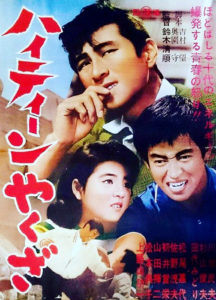Director: Seijun Suzuki
Cast: Tamio Kawaji, Noriko Matsumoto, Keiko Sugiyama, Kayo Matsuo, Asao Sano, Midori Tashiro, Kotoe Hatsui, Tatsuya Fuji, Toshio Sugiyama, Kaku Takashina
Running Time: 72 min.
By Kelly Warner
Listen kids, I know that your teenage years can be rough. Your body is um, changing. You have, uh, urges. And sometimes your emotions are out of control. But you’re a good kid. You know the difference between right and wrong. So when you see some punk in a fake mustache skip out on his restaurant check because the town knows he’s connected to the yakuza, it makes you mad. I won’t stand in your way if you want to teach the mustache man and his cowboy friend a lesson or two – it seems to be the town’s only form of entertainment – but you gotta understand that should you prove victorious, you cannot then go on and fill the punk’s shoes yourself. What I’m trying to say, kids, is this: don’t start an extortion racket in your free time. That was Jiro’s mistake.
Teenage Yakuza is the story of Jiro (Tamio Kawaji, Tokyo Drifter), a tough young man with his heart in the right place. He’s got a lot of friends and the town loves him because he’s the teenage vigilante hero that they need to keep the punks in line (the cops in this town suck). When Jiro and his best friend Yoshio take on the hoods, a girl admirer shouts, “fight!” and draws a crowd of onlookers to the spectacle. Kids cheer and laugh, adults watch with only the slightest hint of disapproval, and the boys vent their frustrations by beating each other to a pulp (for COF readers, I feel it must be said that the fights are pretty lame).
It’s all fun and games until Yoshio gets stabbed in the leg and his dad gets run over by a dump truck (complete with a freeze frame photo of the father with on-screen text about his death). Now Yoshio’s a cripple, his family is in a financial crisis, and it’s up to Jiro to make life easier for his friend. Jiro begins hitting up the folks who owed Yoshio’s family money while at the same time sorting out vengeance on the punks who crippled his friend. In doing so, the townsfolk begin to take notice. When Jiro kicks yakuza-linked hoodlums out of a business, that business owner then approaches Jiro for a job as a bodyguard. You want this stereo you had your eyes on? It’s yours. Oh, you want some groceries? I got fresh produce in today, they’re yours. Here. Take this. Payment for your services. And Jiro takes everything offered, naively accepting their smiles for their approval.
The most interesting moment in the film comes when Jiro (unknowingly) becomes the thing which he had fought against. He has forced the punks out of these businesses and personally filled the void they left behind. And it’s not long before those businesses stop smiling, begin seeing him as the same sort of man as the hoodlums, and now the whole town’s against him. Actually, I say it’s not long because… it’s an almost instant change. This town goes through some mood swings, man. First they love him, then they pay him, then they rat him out to the cops, then they act like he’s dead to them.
To be fair, the film is very short. A running time a little shy of 72 minutes doesn’t give you much time for subtlety. After Jiro realizes what he was doing was wrong, he attempts to make amends but his admirers have turned against him (the “fight!” girl now remarks that he is so “uncool!”), the businesses don’t trust him, and even his friend Yoshio has turned his back on him for reasons of his own. It’s rushed, not terribly interesting, and only occasionally feels sincere.
This is among my least favorite Seijun Suzuki films, not because it’s bad but because it’s so bland and inconsequential. It is the very definition of a minor film in the director’s filmography of badass action movies and weirdo art pictures. There is nary a hint of the same Suzuki we know from Branded to Kill or even the more straightforward Detective Bureau 2-3: Go to Hell Bastards. One assumes this was a quick, cheap studio B-movie for the youth crowd and Suzuki was working on autopilot to see it to its completion.
Teenage Yakuza is the third film in the new Arrow Video set exploring some of Suzuki’s Youth Movies. Whereas I think The Boy Who Came Back may appeal to a wide audience of Japanese film fans and that The Wind-of-Youth Group Crosses the Mountain Pass has enough color and charm to be worth a recommendation, I don’t think Teenage Yakuza will appeal to many beyond the Suzuki completists. Teenage Yakuza is competently made but lacking in anything special, insightful, or memorable.
Kelly Warner’s Rating: 5/10




